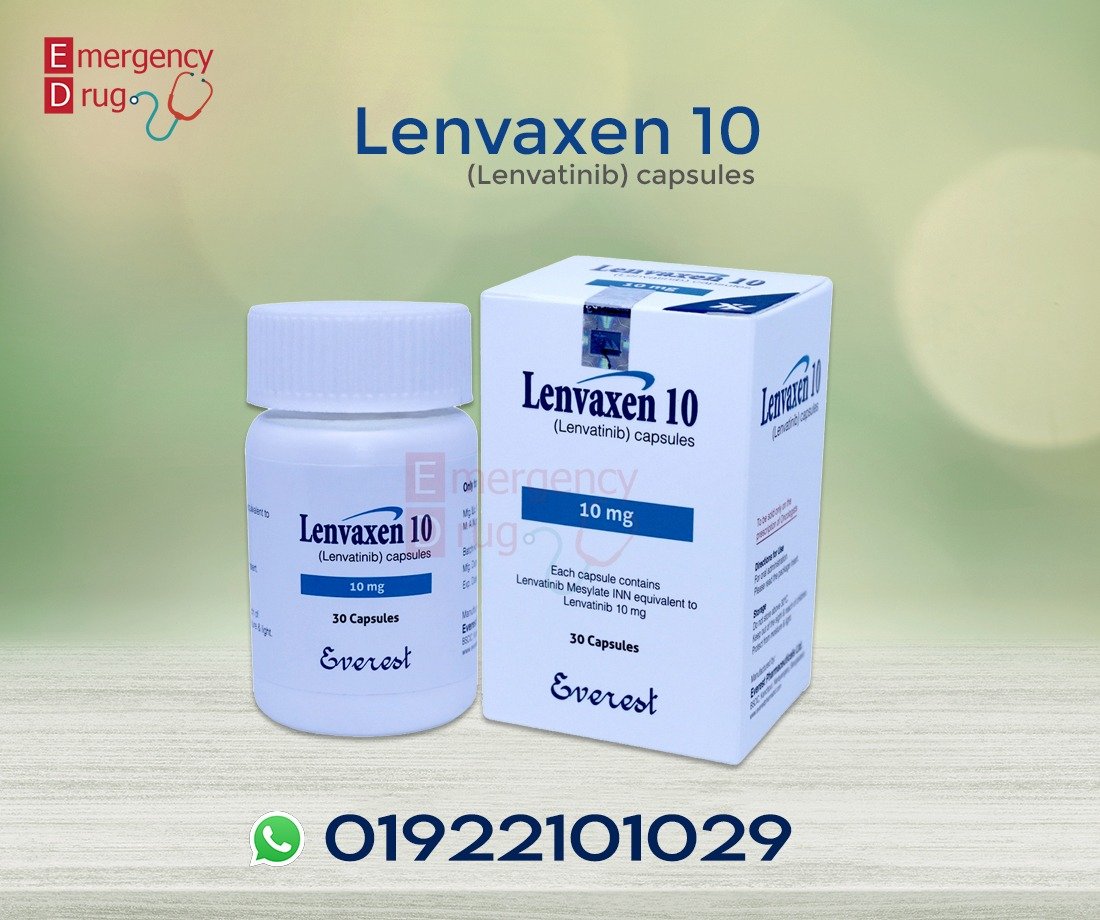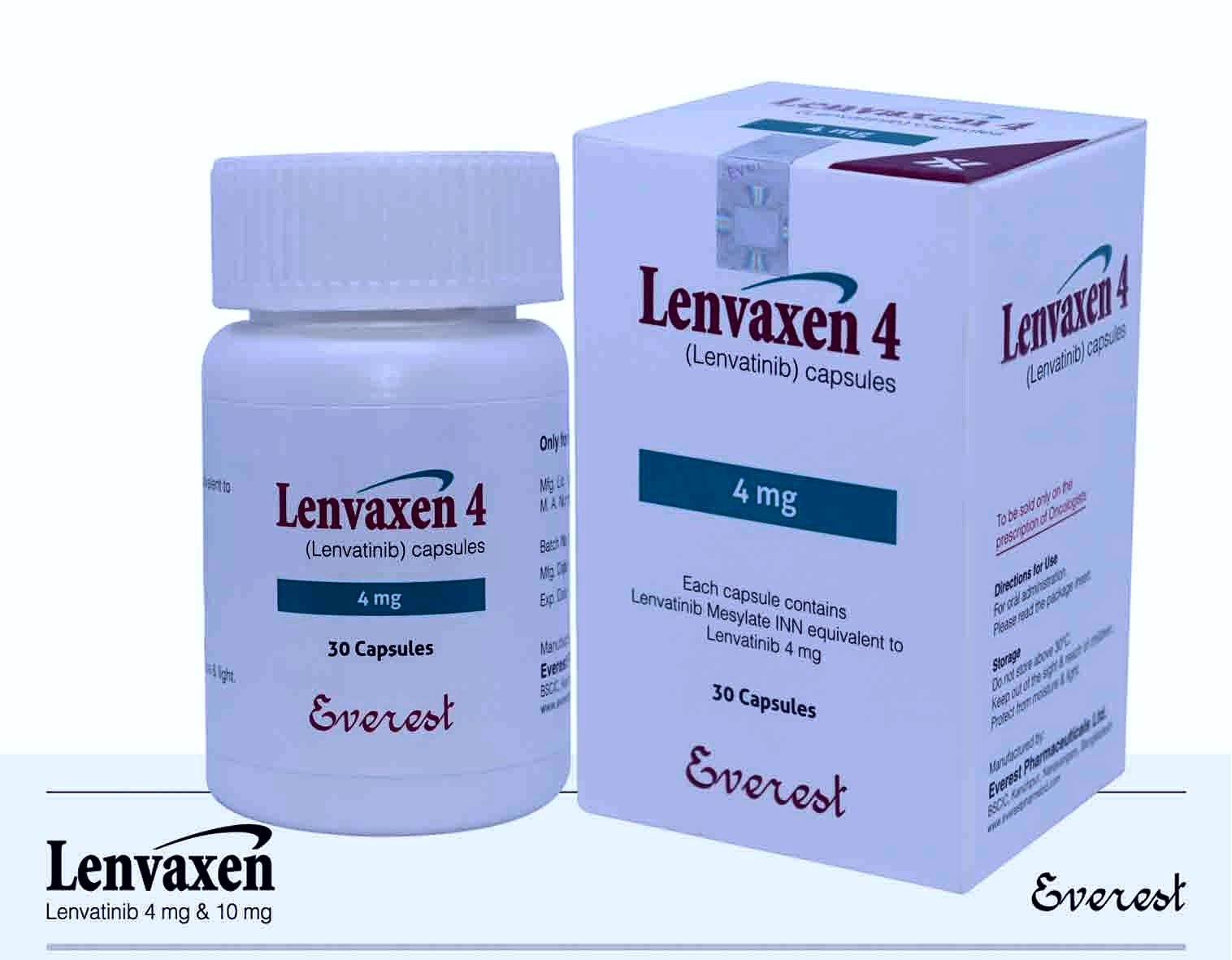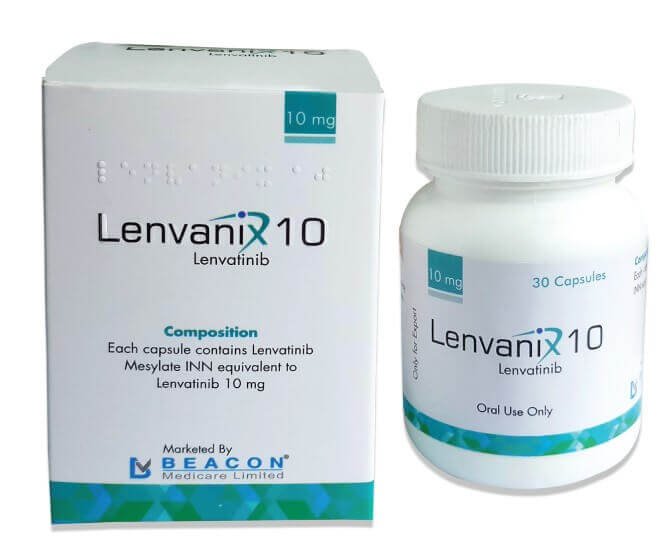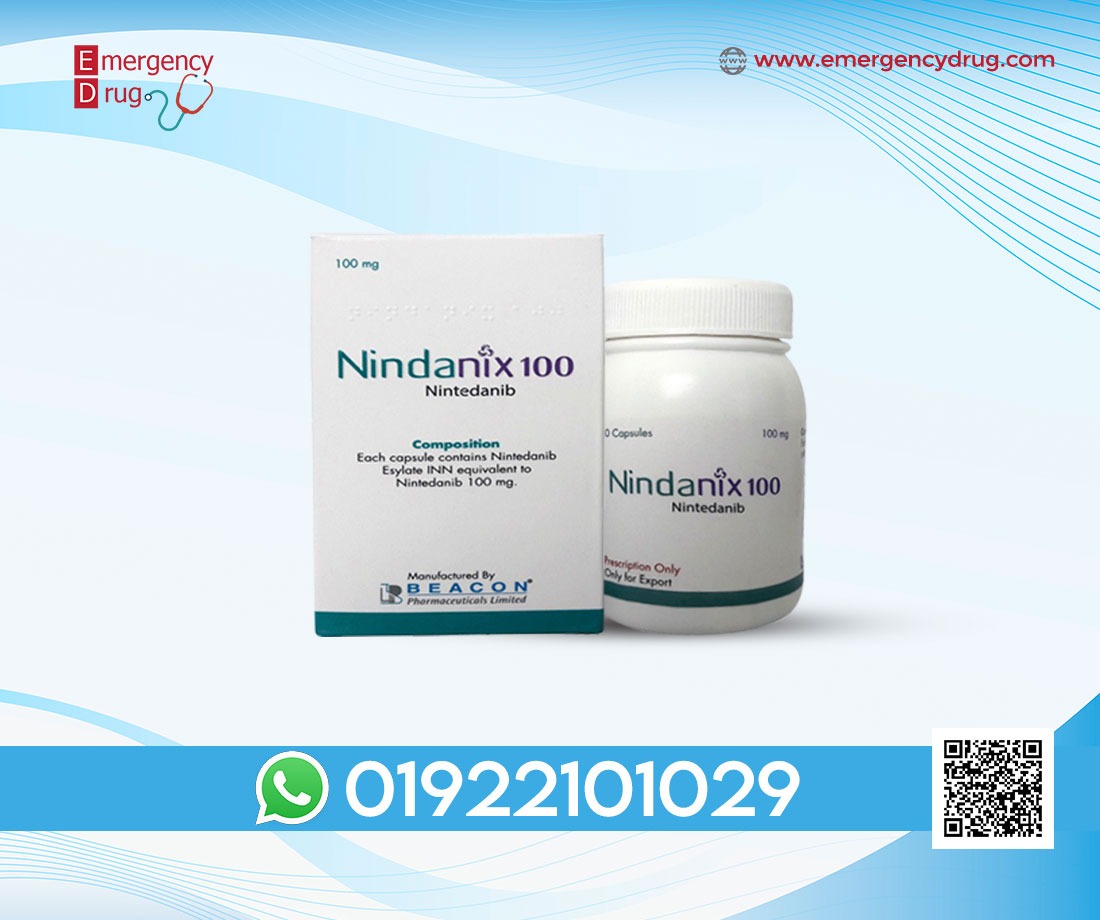
Lenvaxen (Lenvatinib) 10 Mg
Price: $125.00
Lenvaxen(Lenvatinib) is a prescription Medicine use for the treatment of adult patients suffering from Differentiated (papillary, follicular, hurthle cell) thyroid carcinoma (DTC), Refractory to radioactive iodine (RAI) and Hepatocellular carcinoma (HCC).
Manufacturer : Everest Pharmaceuticals Ltd.


Description
Lenvaxen (Lenvatinib) is the generic for the trade name drug Lenvima™. In some cases, health care professionals may use the trade name Lenvima™ when referring to the generic drug name lenvatinib.
Uses Lenvaxen (Lenvatinib):
- For the treatment of patients with locally recurrent or metastatic, progressive, radioactive iodine-refractory differentiated thyroid cancer.
- In combination with the drug everolimus, for the treatment of advanced renal cell carcinoma following one prior anti-angiogenic therapy.
- Treatment of hepatocellular (primary liver) cancer.
- In combination with the drug pembrolizumab for treatment of patients with advanced endometrial cancer.
Lenvatinib Is Given for:
- Lenvatinib is a pill, taken by mouth, once daily. It can be taken with or without food.
- Take lenvatinib exactly as prescribed.
- Swallow Lenvaxen (Lenvatinib) capsules whole. Do not crush, dissolve or open capsules.
- Do not change your dose or stop lenvatinib unless your health care provider tells you to.
- If you miss a dose, take it as soon as you remember. If your next dose is within 12 hours, skip the missed dose and take the next dose at your regular time.
- Do not take more than 1 dose of lenvatinib at one time. Call your health care provider right away if you take too much.
- The amount of lenvatinib that you will receive depends on many factors, your general health or other health problems, and the type of cancer or condition being treated.
- Dose modifications are often made so it is important to let your healthcare provider know of any side effects.
Side Effects:
Important things to remember about the side effects of Lenvaxen (Lenvatinib):
- Most people do not experience all of the side effects listed.
- Side effects are often predictable in terms of their onset and duration.
- There are many options to help minimize or prevent side effects.
- There is no relationship between the presence or severity of side effects and the effectiveness of the medication.
The following side effects are common (occurring in greater than 30%) for patients taking lenvatinib:
- High blood pressure
- Diarrhea
- Fatigue
- Joint/muscle aches
- Decreased appetite
- Weight loss
- Nausea
- Stomatitis (mouth sores)
- Headache
- Vomiting
- Proteinuria (protein in the urine)
- Palmar-plantar erythrodysesthesia (hand-foot syndrome)
- Abdominal pain
- Dysphonia (difficulty speaking)
These side effects are less common side effects (occurring in about 10-29%) of patients receiving lenvatinib:
- Constipation
- Oral pain
- Cough
- Swelling
- Rash
- Taste changes
- Dry mouth
- Dizziness
- Heartburn
- Hair loss
- Nose bleed s
- Insomnia (trouble sleeping)
- Urinary tract infection
- Dental & oral infections
Not all side effects are listed above. Some that are rare (occurring in less than 10% of patients) are not listed here. However, you should always inform your health care provider if you experience any unusual symptoms.
Tell your doctor or health care provider if:
Contact your health care provider, day or night, and go to the emergency room, if you should experience any of the following symptoms:
- Fever of 100.4° F (38°C or higher, chills)
- Symptoms of heart problems such as shortness of breath or swelling
- Symptoms associated with a possible blood clot, such as: chest pain or pressure; pain in your arms, back, neck or jaw; numbness or weakness on one side of your body; trouble talking; sudden or severe headache; sudden vision changes
- Severe stomach (abdominal) pain
- Severe headache, seizures, weakness, confusion, blindness or change in vision. This could be a rare syndrome call Reversible Posterior Leukoencephalopathy.
The following symptoms require medical attention, but are not an emergency. Contact your health care provider within 24 hours of noticing any of the following:
- High blood pressure
- Diarrhea (4-6 episodes in a 24-hour period).
- Nausea (interferes with ability to eat and unrelieved with prescribed medication).
- Vomiting (vomiting more than 4-5 times in a 24 hour period).
- Unable to eat or drink for 24 hours or have signs of dehydration: tiredness, thirst, dry mouth, dark and decrease amount of urine, or dizziness.
- Skin or the whites of your eyes turn yellow
- Urine turns dark or brown (tea color)
- Light-colored bowel movements
- Decreased appetite
- Pain on the right side of your stomach
- Bleed or bruise more easily than normal (nose bleeds, coughing up blood, heavy vaginal bleeding, bleeding from the rectum)
- Skin changes (rash, acne, itching, blisters, peeling, redness or swelling).
Always inform your health care provider if you experience any unusual symptoms.
Precautions:
- Before starting Lenvaxen (Lenvatinib) treatment, make sure you tell your doctor about any other medications you are taking (including prescription, over-the-counter, vitamins, herbal remedies, etc.).
- Do not receive any kind of immunization or vaccination without your doctor’s approval while taking lenvatinib.
- Inform your health care professional if you are pregnant or may be pregnant prior to starting this treatment. Pregnancy category D (lenvatinib may be hazardous to the fetus. Women who are pregnant or become pregnant must advised of the potential hazard to the fetus.)
- For both men and women: Do not conceive a child (get pregnant) while taking lenvatinib. Barrier methods of contraception, such as condoms, are recommended during treatment and for at least 2 weeks following completion of therapy. Discuss with your doctor when you may safely become pregnant or conceive a child after therapy.
- Do not breast feed while taking this medication.
Self-Care Tips:
- High blood pressure may be a side effect of lenvatinib. You blood pressure should well control before starting lenvatinib. Your healthcare provider will check your blood pressure regularly during treatment.
- Drink at least two to three quarts of fluid every 24 hours, unless you are instructed otherwise.
- If you should experience nausea, take anti-nausea medications as prescribed by your doctor, and eat small frequent meals. Sucking on lozenges and chewing gum may also help.
- Avoid sun exposure. Wear SPF 30 (or higher) sun block and protective clothing.
- In general, drinking alcoholic beverages should kept to a minimum or avoid completely. You should discuss this with your doctor.
- Get plenty of rest.
- Maintain good nutrition.
- Lenvatinib can cause tiredness, weakness or blurred vision. If you have any of these symptoms, use caution when driving a car, using machinery, or anything that requires you to be alert.
- If you experience symptoms or side effects, be sure to discuss them with your health care team. They can prescribe medications and/or offer other suggestions that are effective in managing such problems.
Monitoring and Testing:
You will check regularly by your health care professional while you are taking lenvatinib to monitor side effects and check your response to therapy. Testing may include but is not limited to:
- Blood pressure
- Liver and kidney functions
- Electrolytes
- Urine protein level
- Electrocardiogram (EKG)
- Thyroid hormone levels
For more Oncology medicine, visit our SHOP












Reviews
There are no reviews yet.